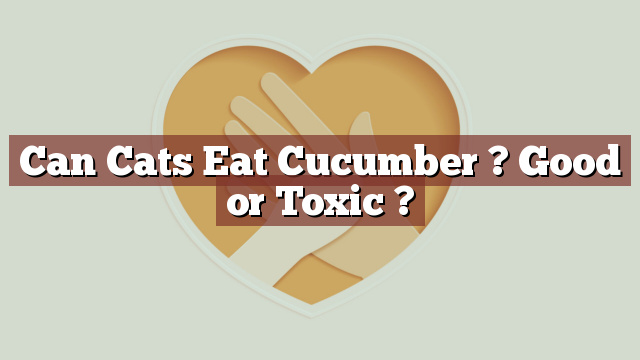Can Cats Eat Cucumber? Good or Toxic?
Knowing which foods are safe for our pets is essential for their health and well-being. Cats, being obligate carnivores, have specific dietary requirements that differ from those of omnivores like humans and dogs. While it is important to feed cats a balanced diet primarily consisting of meat, it is natural for cat owners to wonder if their feline companions can enjoy certain fruits and vegetables. One such vegetable is the cucumber. In this article, we will explore whether cats can safely consume cucumber and the potential risks and benefits associated with it.
Nutritional Value of Cucumber: Low in calories, high in hydration
Cucumbers are known for their high water content, making them a hydrating and refreshing snack for humans. Additionally, they are low in calories and fat, making them a healthy choice for weight management. Cucumbers also contain vitamins such as vitamin K, vitamin C, and several B vitamins. They also provide minerals like potassium, magnesium, and manganese. Despite their nutritional value for humans, it is important to consider whether these benefits extend to our feline friends.
Can Cats Eat Cucumber? Generally safe but moderation is key
Yes, cats can eat cucumber, and it is generally considered safe for them. The vegetable itself is not toxic to cats and does not pose any immediate danger. However, it is important to note that cats have different nutritional needs compared to humans and even dogs. While cucumbers are generally safe for cats, they should be given in moderation and as an occasional treat rather than a staple in their diet.
Potential Risks or Benefits: Promotes hydration, aids digestion
One of the main benefits of cucumbers for cats is their high water content. Feeding cucumbers to your cat can help promote hydration, especially during hot weather or if your cat tends to have a low water intake. Additionally, the fiber content in cucumbers can aid in digestion and promote healthy bowel movements. However, it is important to remember that too much fiber can have the opposite effect and cause digestive upset, such as diarrhea. Therefore, it is crucial to introduce cucumbers gradually into your cat’s diet and monitor their response.
What to Do if Your Cat Eats Cucumber: Monitor for any adverse reactions
If your cat happens to nibble on a cucumber or you decide to offer them a small piece, it is important to monitor their reaction. While most cats can tolerate cucumber well, some may experience mild gastrointestinal upset such as vomiting or diarrhea. If your cat shows any signs of discomfort or has an adverse reaction, it is advisable to discontinue feeding cucumber and consult your veterinarian for further guidance.
Conclusion: Cucumber can be a refreshing and healthy occasional treat for cats
In conclusion, cats can eat cucumber in moderation as an occasional treat. Cucumbers provide hydration and some nutritional benefits, but they should not replace a balanced and species-appropriate diet. It is important to remember that each cat is unique, and some may have individual sensitivities or allergies. If in doubt or if your cat exhibits any unusual symptoms after consuming cucumber, it is always best to consult with your veterinarian for personalized advice.
Thank you for investing your time in exploring [page_title] on Can-Eat.org. Our goal is to provide readers like you with thorough and reliable information about various dietary topics. Each article, including [page_title], stems from diligent research and a passion for understanding the nuances of our food choices. We believe that knowledge is a vital step towards making informed and healthy decisions. However, while "[page_title]" sheds light on its specific topic, it's crucial to remember that everyone's body reacts differently to foods and dietary changes. What might be beneficial for one person could have different effects on another. Before you consider integrating suggestions or insights from "[page_title]" into your diet, it's always wise to consult with a nutritionist or healthcare professional. Their specialized knowledge ensures that you're making choices best suited to your individual health needs. As you navigate [page_title], be mindful of potential allergies, intolerances, or unique dietary requirements you may have. No singular article can capture the vast diversity of human health, and individualized guidance is invaluable. The content provided in [page_title] serves as a general guide. It is not, by any means, a substitute for personalized medical or nutritional advice. Your health should always be the top priority, and professional guidance is the best path forward. In your journey towards a balanced and nutritious lifestyle, we hope that [page_title] serves as a helpful stepping stone. Remember, informed decisions lead to healthier outcomes. Thank you for trusting Can-Eat.org. Continue exploring, learning, and prioritizing your health. Cheers to a well-informed and healthier future!

